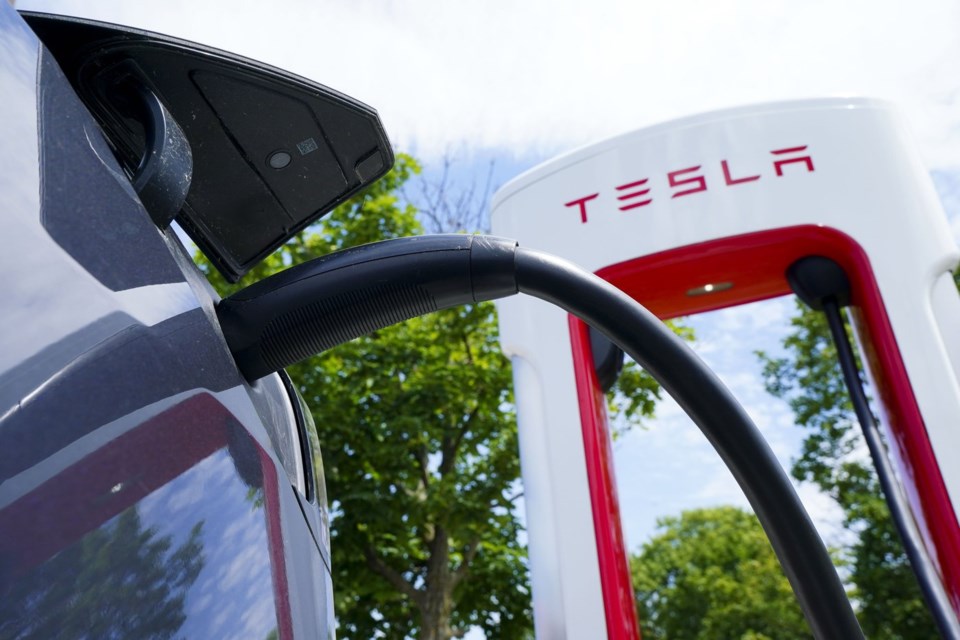OTTAWA — Tesla legitimately claimed thousands of electric vehicle rebates in the final weekend before the department suspended its rebate program in January, Transport Canada said on Friday.
In an email to the Canadian Press, a spokesperson for Transport Minister Chrystia Freeland said that while the department is still assessing a few claims, Transport Canada's investigation found the claims made by Tesla "were determined to legitimately represent cars sold before January 12."
It said all dealerships’ claims were evaluated using the same criteria.
January 12 was the last day rebate claims were accepted under the popular Incentives for Zero-Emission Vehicles program, known as iZEV. Ottawa spent nearly $3 billion on iZEV during its five-year lifespan. The program provided up to $5,000 toward the purchase of a new zero-emissions vehicle.
On Friday, January 10, Transport Canada announced it would be suspending the program as soon as the remaining funds ran out. Three days later it announced that had happened and that no more rebates would be paid out for claims made after Jan. 12.
As first reported by The Toronto Star, Tesla made 8,600 rebate claims over that weekend, worth $43 million. Following The Star's report in March, Freeland said the government was freezing all rebate payments to Tesla until its claims were validated.
It's still not clear whether Tesla claimed it had sold all those cars on that weekend, or whether the claims were for sales that hadn't yet been filed with the government to receive the iZEV rebate.
Transport Canada maintains a public database for iZEV rebate claims. But the database doesn't state when a vehicle was sold — only the date when the incentive request was made, which could come well after a sale and delivery to the customer.
Tesla has not responded to multiple requests for comment from The Canadian Press.
When the iZEV program was abruptly suspended, hundreds of dealerships were forced to swallow the cost of any rebate claims they hadn't yet submitted. On Friday, Transport Canada laid out how those dealerships will be reimbursed and announced a one-month window for those dealerships to make a claim to get their money back.
In a call with dealerships, Transport Canada officials said any vehicle which was delivered to customers before the program paused on Jan. 12 will be eligible for reimbursement.
The Canadian Automobile Dealers Association welcomed the news. It estimates its 3,500 members are owed about $11 million for rebates on vehicles they had already sold to customers.
"I had dealers calling immediately after (Transport Canada's briefing) who were very emotional on the phone, who have been worried about this, because this has had a huge impact on their cash flow," said Huw Williams, the organization's public affairs director.
"It was quite emotional on the other side to hear dealers are going to get paid because not every manufacturer covered their dealer or supported their dealers."
Dealerships will only be allowed to file a maximum of 25 claims per day. Williams said that will more than cover the shortfall. He said the largest sum owed to a single dealership is about $600,000.
Transport Canada also said any vehicle purchased before the Jan. 12 cutoff date but delivered to the customer after that point won't be eligible for reimbursement.
"The cutoff date is something we'll be discussing with Transport Canada," Williams said.
"We'll have to see how big that problem is and whether that can be resolved. But for the moment, this is a win for dealers."
Dealerships can now make claims for vehicles delivered to customers as far back as April 1, 2024.
"It was a shocking series of events in January when they shut down the program after giving notice that the program would go through an orderly wind-down," Williams said.
While Williams accepted Transport Canada's conclusion that Tesla's claims in the final weekend of the iZEV program were legitimate, he questioned the timing and the volume of the claims — coming just as the program was about to be suspended.
"I think there's a larger question as to how Tesla knew to run those through on that weekend," Williams said.
"It doesn't appear to me that we have an investigation into any communication between Transport Canada and Tesla, between officials who may have shared information inappropriately."
EV sales have sagged since the iZEV program was suspended. EV sales under the program peaked in December 2024 at 18.29 per cent of all new vehicles sold — the last full month before the program was suspended.
Sales fell in January to 11.95 per cent and slid further to 7.53 per cent in April, according to the most recent data from Statistics Canada.
Federal ministers have said the government is working toward bringing back consumer incentives for EVs — a promise also made in the Liberal party's election platform.
Automakers say such promises are making sales slump even further as buyers wait for the rebates to come back.
This report by The Canadian Press was first published July 11, 2025.
Nick Murray, The Canadian Press



